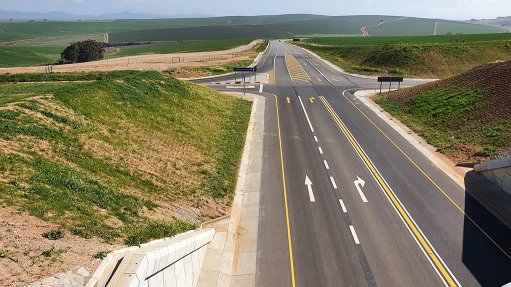UK reassures Sacu about future trade relations, reaffirms commitment to free trade
The Southern African Customs Union (Sacu) has welcomed the UK’s intention to prevent disruption of trade relations with other countries as it leaves the European Union (EU). This was affirmed in a joint statement issued by Sacu and the UK following discussions between Trade Ministers from the two parties in Johannesburg on July 19.
“The UK reaffirmed its commitment to the trade arrangement under the current EU-SADC (Southern African Development Community) EPA (Economic Partnership Agreement) and to maintain current market access to the UK following its withdrawal from the EU, and to ensure continuity of the effects of the EU-SADC EPA,” noted the statement. “The two sides agreed to continue discussions to explore ways to ensure that the existing trade arrangement between the UK and Sacu currently governed by the EU-SADC EPA will not be disrupted by the UK’s departure from the EU, and to ensure continuity of the effects of the EU-SADC EPA.”
These discussions will likely be of a technical nature to guarantee the continuation of the current trade arrangements, ensuring the replication of the EPA. They would not involve any renegotiation of the trading relationship.
The Sacu member States were represented at the talks by their Ministers responsible for trade policy. Botswana was represented by Trade and Industry Minister Vincent Seretse; Namibia, Industrialisation, Trade and Small and Medium Enterprises Minister Immanuel Ngatjizeko; South Africa, Trade and Industry Minister Dr Rob Davies; and Swaziland, Commerce and Trade Minister Jabulani Mabuza, while Lesotho was represented by its Principal Secretary of Trade and Industry, Fusi Notoane, standing in for his Minister. The UK was represented by Minister of State for Trade Policy Lord Price.
Although not a member of Sacu, Mozambique took part in the talks, represented by its high commissioner in Pretoria, PJ Macaringue. “Given Mozambique’s participation in the SADC EPA, the Ministers agreed to continue discussions on how best to work with Mozambique in order to ensure continuity of the EPA for all partners,” reported the statement.
Quite separately, the day after, in Switzerland, British International Trade Secretary Dr Liam Fox clearly reaffirmed Britain’s commitment to free trade and its importance in helping developing countries. He was speaking at the Graduate Institute, in Geneva. (Geneva hosts the head office of the World Trade Organisation, or WTO.)
“The lesson of history is unequivocal – free and open trade is fundamentally beneficial to mankind,” he affirmed. “As one of the world’s major economies, we are dedicated not only to helping the global rules-based system adapt to the wider challenges [of today] but also to leading by example, using our influence to work to advance the cause of free trade, and prepare the system for the economic challenges of the twenty-first century.”
He highlighted “the promotion of trade as the main tool of development” as one of the three factors that London believes would shape the future of world trade. (The other two were the “digital economy” and “unlocking the vast potential of the trade in services”.)
“After all, trade is a key driver of economic growth and development, helping to raise incomes, create jobs and lift people out of poverty,” he pointed out. “Take India, for example. In 1993, around 45% of India’s population sat below the poverty line, as defined by the World Bank. In 2011, it was 22%. It is no coincidence that, in the intervening period, India embraced globalisation and started to liberalise its economy . . . We remain committed to ensuring least developed countries and other developing country trading partners can harness the formidable power of trade to reduce poverty . . . Britain, as an independent WTO member, will always defend and champion the cause of free trade and market access for those economies that require it most . . . It is incumbent upon all developed nations to extend the benefits of free trade to emerging economies, and offer them a route to prosperity.”
Comments
Press Office
Announcements
What's On
Subscribe to improve your user experience...
Option 1 (equivalent of R125 a month):
Receive a weekly copy of Creamer Media's Engineering News & Mining Weekly magazine
(print copy for those in South Africa and e-magazine for those outside of South Africa)
Receive daily email newsletters
Access to full search results
Access archive of magazine back copies
Access to Projects in Progress
Access to ONE Research Report of your choice in PDF format
Option 2 (equivalent of R375 a month):
All benefits from Option 1
PLUS
Access to Creamer Media's Research Channel Africa for ALL Research Reports, in PDF format, on various industrial and mining sectors
including Electricity; Water; Energy Transition; Hydrogen; Roads, Rail and Ports; Coal; Gold; Platinum; Battery Metals; etc.
Already a subscriber?
Forgotten your password?
Receive weekly copy of Creamer Media's Engineering News & Mining Weekly magazine (print copy for those in South Africa and e-magazine for those outside of South Africa)
➕
Recieve daily email newsletters
➕
Access to full search results
➕
Access archive of magazine back copies
➕
Access to Projects in Progress
➕
Access to ONE Research Report of your choice in PDF format
RESEARCH CHANNEL AFRICA
R4500 (equivalent of R375 a month)
SUBSCRIBEAll benefits from Option 1
➕
Access to Creamer Media's Research Channel Africa for ALL Research Reports on various industrial and mining sectors, in PDF format, including on:
Electricity
➕
Water
➕
Energy Transition
➕
Hydrogen
➕
Roads, Rail and Ports
➕
Coal
➕
Gold
➕
Platinum
➕
Battery Metals
➕
etc.
Receive all benefits from Option 1 or Option 2 delivered to numerous people at your company
➕
Multiple User names and Passwords for simultaneous log-ins
➕
Intranet integration access to all in your organisation

















